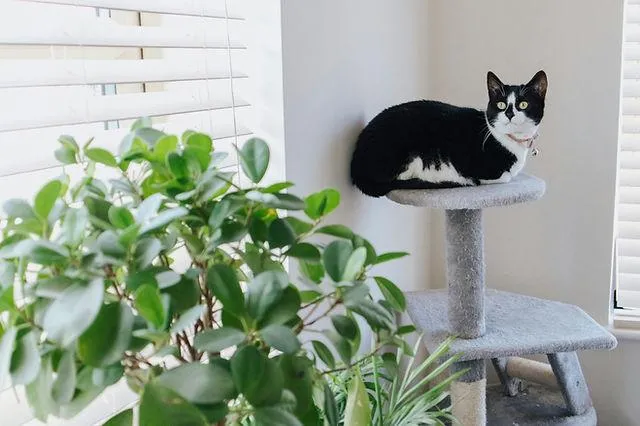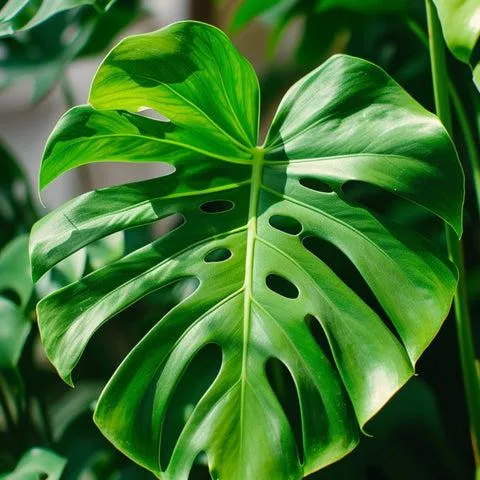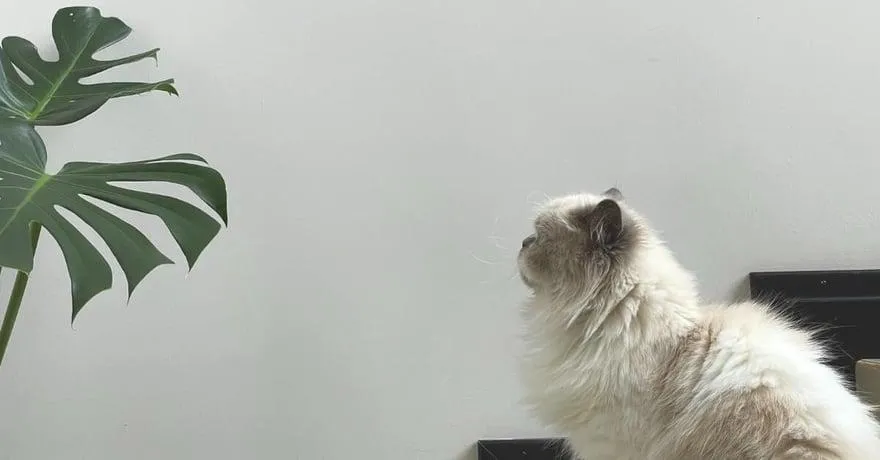Are Monsteras Safe For Cats? A Detailed Guide
If you have a furry feline friend at home and are considering adding a beautiful monstera plant to your indoor space, you may be wondering – are monsteras safe for cats? In this in-depth article, I’ll explore the safety of monsteras for cats and provide answers to all your questions on this topic.
An Overview of Monsteras
Monstoras, also commonly known as Swiss cheese plants, are one of the most popular houseplants thanks to their large, deeply lobed leaves. Native to tropical rainforests in Central and South America, monsteras thrive in medium to low light and enjoy moist soil. They are climbing vines that can grow over 10 feet long if given optimum conditions.
While their exotic appearance makes them a desirable indoor plant, we must consider whether monsteras are feline-friendly before bringing one home if cats are part of the household. From my experience caring for dozens of plant and animal companions over the years, ensuring safety is the top priority when making decisions about sharing living spaces.
Toxicity Risks of Monsteras for Cats
The good news is that monsteras are considered non-toxic to cats according to the American Society for the Prevention of Cruelty to Animals (ASPCA). However, they do note that ingestion of large quantities of the plant may cause mild gastrointestinal upset in pets.
The primary risks come from cats chewing on or eating the plant. While monsteras themselves are not toxic, cats may chew or eat the leaves, stems or vines and swallow small pieces which could pose a choking hazard or cause an intestinal blockage requiring medical intervention. Kittens and older cats are more vulnerable to these risks.

Introducing a Monstera to a Cat-Friendly Home
Now that we understand monsteras are generally safe for cats as long as they are not ingested, here are some tips for successfully introducing one to your feline family:
- Start with a small plant and monitor interactions closely until you know your cat will leave it alone.
- Choose a tall location like on a bookshelf or hanging plant to discourage batting and chewing of leaves.
- Use horizontal wire shelving or a heavy hanging planter to further deter climbing cats.
- Provide plenty of approved scratching posts and toys as alternatives for cats to entertain themselves.
- Give your cat other furniture like cat trees or shelves at their level for lounging away from plant temptation.
- Consider applying sticky paws tape or aluminum foil around the planter as some cats dislike the feeling on paws.
- Be ready with distractions like treats or play if your cat shows interest in the plant.
With supervision during introduction and using cat-proofing techniques, monsteras can coexist peacefully with feline friends when given the proper care and respect for pet safety. But every cat is different – monitor yours closely and don’t hesitate to move the plant if any chewing occurs.
Personal Experience Introducing a Monstera to My Cat
I’ll share my own experience trial-introducing a monstera to my cat Nala as an example. She is very curious but has never been one to chew on plants before. I started with a small 4-inch plant on a high shelf. Nala climbed up initially to investigate but lost interest quickly. After a week with no issues, I moved it down lower.
She seemed fascinated by the big perforated leaves for a bit. I distracted her with toys when she paid too much attention. Within a few days she ignored it, confident it wasn’t a toy. Now six months later, my monstera has grown beautifully and Nala doesn’t spare it a second glance! With patience and adaptations for feline tendencies, peaceful cohabitation is possible.
Other Toxic Plant Dangers to Be Cautious of
While monsteras themselves pose low risks to nibbling kitties, there are certain other common houseplants that can be highly toxic to pets if ingested. I’ll list a few here to stay informed:

– Lilies: All parts are toxic and even small amounts can cause kidney failure in cats.
– Tulips and daffodils: Contain insoluble calcium oxalate crystals that can cause oral irritation and gastrointestinal upset.
– Peace lilies: Can cause vomiting and diarrhea if eaten.
– Ferns: Some varieties like Boston ferns and sword ferns contain calcium oxalate raphides that can irritate mouths.
– Oleander and Autumn Crocus: Cardiac glycosides can cause decreased heart rate and even death.
By being aware of toxin dangers for pets, we can make safer plant selections or take proper precautions to peacefully coexist with our indoor plant and animal friends. Overall when introducing any new plant, supervise kitties closely at first until confident it won’t be disturbed.
Final Thoughts on Monsteras and Cats
In conclusion, while monsteras themselves pose low risks to cats, there is always a chance for minor gastrointestinal upset if pieces are ingested. The best approach is using cat-proofing strategies, choosing locations cats can’t access, providing alternative entertainment and always monitoring new introductions closely. With some simple precautions based on individual pet tendencies, monsteras can absolutely be part of a cat-friendly home. I hope this extensive guide has answered all your questions about keeping monsteras safely with cats! Please let me know if you need any other advice.
Is a Monstera Plant Safe for Cats?
| Plant Part | Safety Level |
|---|---|
| Leaves | Generally safe but may cause mild stomach upset |
| Stems | Potentially toxic and may cause vomiting or diarrhea |
| Young unfurled leaves | More likely to cause issues as these contain higher concentrations of toxins |
| Sap | Can cause mild to severe irritation to mouth and digestive tract |
| Bulbs/Tubers | Highly toxic and can cause gastrointestinal upset or neurotoxic effects |
| Ripe berries | Edible for humans but should be kept well out of reach of cats |
| Symptoms of toxicity | Vomiting, drooling, diarrhea, loss of appetite, depression |
FAQ
-
Are monsteras poisonous to cats?
Monsteras aren’t generally considered super harmful for cats, but their leaves and stems can be a little bit toxic. If a cat eats a large amount of monstera plant parts, it could cause some tummy troubles. However, a nibble here and there is unlikely to do much harm. Basically, it’s best to keep monsteras up high or behind closed doors so curious kitties can’t get to them.
-
Will a monstera hurt my cat if they chew on it?
It’s possible, but not too serious in most cases. Monsteras contain oxalates which can irritate a cat’s mouth if they decide to taste the leaves. At the same time, cats may also experience vomiting or diarrhea after munching on monstera. Nevertheless, it usually isn’t enough oxalates to do permanent damage unless your feline friend devours a massive chunk of the plant. On the other hand, it’s still best to keep monsteras out of pawing and biting reach of your furry friends.

-
Are the leaves toxic to cats?
Sort of. While monsteras aren’t highly toxic like poisonous plants, it’s not a great idea for cats to nibble on the leaves. They contain small amounts of calcium oxalate crystals that can irritate a cat’s mouth and possibly cause some stomach upset if eaten in large quantities. Cats may also try to eat bouquet-like things as a kind of play. Still, as long as kitty doesn’t routinely chew leaves, it likely won’t cause big troubles. Better safe than sorry – maybe put the plant up high!
-
Can cats get sick from a monstera plant?
It’s possible, but not a sure thing. If a cat ingests big chunks of monstera leaves, stems or fruit, it may experience mild tummy troubles like diarrhea, vomiting or loss of appetite. Apparently the calcium oxalate crystals in monsteras can irritate a cat’s digestive system if too much is consumed. However, an occasional nibble isn’t too risky according to veterinary experts. The plant would need to be a cat’s main food source before real problems emerge. So just keep monsteras out of paw’s reach to stay on the safe side.
-
What part of the monstera plant is toxic to cats?
As far as we know from various cat experts, all parts of the monstera plant – including the leaves, stems and fruit – contain small amounts of calcium oxalates that can potentially cause issues if a cat goes overboard. But the leaves may pose a little more risk than other plant parts since they would be the easiest for curious kitties to chew on. The good news is a tiny taste here or there is unlikely to do much harm. It would take a pretty large swallowed amount to get a cat genuinely sick. Still, best to keep monsteras out of biting reach as a precaution.
-
Can having a monstera help deter cats?
That’s an interesting thought, but doesn’t appear to be scientifically proven. While some cats may avoid chewing or walking on the plant’s prickly leaves, others seem quite intrigued by tall green things they can bat around. A strong-willed cat might even chomp on monstera foliage for entertainment value! Humorously, having the plant could go either way – it may or may not stop feline antics, depending on your individual cat’s personality. Ultimately, closing doors when you can’t supervise is still the safest way to guarantee kitty safety and your plant’s well-being.
-
Can a cat who eats a monstera die?
Unless they devoured an unspeakably monstrous amount of the plant, it would take quite a lot for a monstera leaf to be fatal to a cat. Vets say the calcium oxalate crystals could cause mouth irritation or an upset tummy at most. While not ideal for kitty to nibble, an occasional bite here or there likely won’t do much harm according to experts. A cat would have to basically make the monstera its main food before facing health troubles. So in summary – not a great snack, but a small taste probably won’t kill your purring pal either according to the pros. Still, better safe than sorry with curious kitties!

